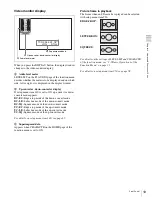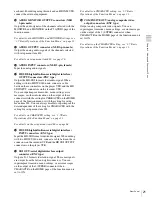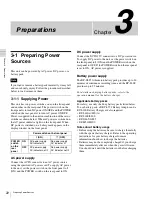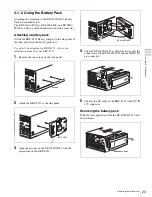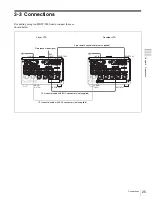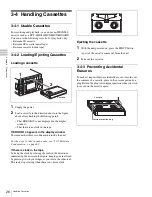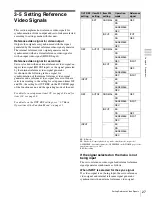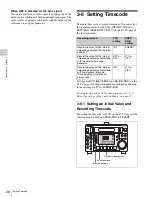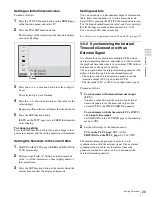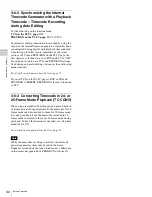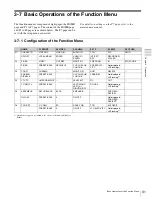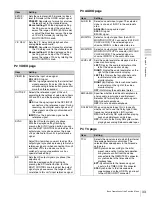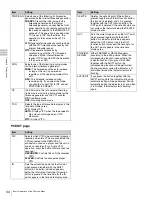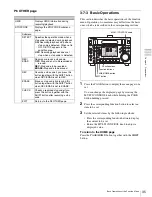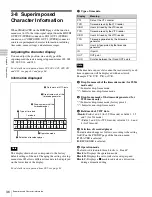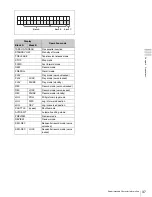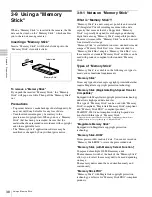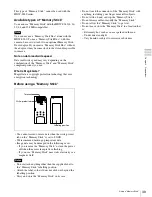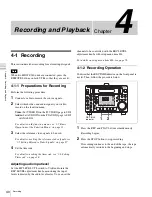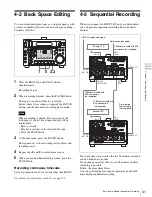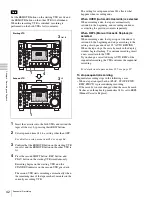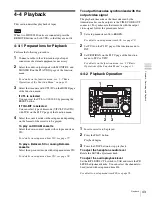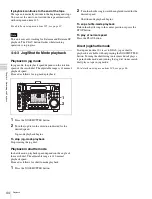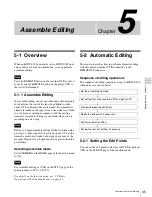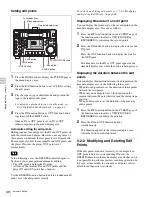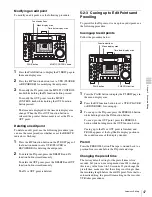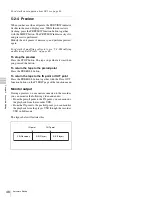
33
Basic Operations of the Function Menu
Chapt
er
3
P
rep
ar
at
ions
P2 VIDEO page
P3 AUDIO page
P4 TC page
SETUP/
BLACK
Sets the setup level (59.94i mode) or black
level (50i mode) of the HD/SD output signal.
PRESET:
Regardless of manually set values,
the level is set to the standard value.
Manual setting:
With the displayed setting
flashing, you can adjust the setup level
across the range ±30 IRE (59.94i mode)
or adjust the black level across the range
±210 mV (50i mode) by rotating the
MULTI CONTROL knob.
Y/C DELY
Sets the Y/C delay during playback of an
analog Betacam cassette.
PRESET:
Regardless of manually set values,
the Y/C delay is set to the standard value.
Manual setting:
With the displayed setting
flashing, you can adjust the Y/C delay
across the range ±100 ns by rotating the
MULTI CONTROL knob.
Item
Setting
VIDEO IN
Selects the input video signal.
SDI:
HD SDI signal
SG:
Test signal generated by the internal test
signal generator (To select SG, hold the
corresponding function button pressed for
more than three seconds.)
OUT REF
Selects the reference signal of this unit,
according to the settings of setup menu items
309 and 334, and the operating state of this
unit.
REF:
Use the signal input to the REF INPUT
connector as the reference signal. During
recording, input digital audio signals and
video signals must be synchronized with
this signal.
INPUT:
Use the input video signal as the
reference signal.
SYNC
Sets the HD output signal sync phase.
With the displayed setting flashing by
pressing the SYNC function button, you can
turn the MULTI CONTROL knob to adjust the
output signal sync phase across the range
±15 µs relative to this unit’s input reference
signal.
Adjust this item when you want to adjust the
output signal sync phase precisely to match a
reference signal, or when connecting this unit
and other VTRs to a device such as a
switcher to carry out operations such as
special effects editing.
SC
Sets the HD output signal sync phase (fine
adjustment).
With the displayed setting flashing by
pressing the SC function button, turn the
MULTI CONTROL knob to adjust the output
signal sync phase across the range of ±200
ns relative to this unit’s input reference signal.
Item
Setting
Item
Setting
AUDIO IN
Selects an audio input signal. The selected
signal is shown at INPUT in the audio data
area.
ANALOG:
Analog audio signal
SDI:
SDI signal
SG:
SG signal
MONITR L
Selects an output signal from the AUDIO
MONITOR OUTPUT L connector (CH1/CH2/
CH3/CH4/CUE). The selected signal is
shown at MONI L in the audio data area.
MONITR R
Selects an output signal from the AUDIO
MONITOR OUTPUT R connector (CH1/CH2/
CH3/CH4/CUE). The selected signal is
shown at MONI R in the audio data area.
LEVEL MT
Sets the audio level meter displayed on the
video monitor display.
LEFT:
Display the audio level meter on the
left of the video monitor display.
RIGHT:
Display the audio level meter on the
right of the video monitor display.
LEFT (4):
Displays the four-channel audio
level meters on the left of the video
monitor display.
RIGHT (4):
Displays the four-channel audio
level meters on the right of the video
monitor display.
OFF:
Not display the audio level meter.
EMPHASIS Specifies whether to add audio emphasis to
analog audio input signals and Betacam/
Betacam SP format playback audio signals.
ON:
Add audio emphasis.
OFF:
Do not add audio emphasis.
DOLBY NR When using oxide tapes, this is to specify
whether or not to use the Dolby type C low-
frequency noise reduction (NR) system.
ON:
Use the Dolby NR system when playing
back analog Betacam oxide tapes.
OFF:
Do not use the Dolby NR system when
playing back analog Betacam oxide tapes.
Item
Setting
TCG
Selects the signal source to which the internal
timecode generator synchronizes. The
selected timecode appears in the timecode
setup area.
INT:
Synchronize according to the initial
preset value set by front panel operation
or by remote control from the device
connected to the REMOTE 9P connector,
or synchronize to the timecode of the
playback tape.
EXT:
Synchronize to the timecode signal
input via the TIME CODE IN connector.
SDI:
Synchronize to the timecode data
superimposed on the HD SDI signal input
to the HD SDI INPUT connector.

